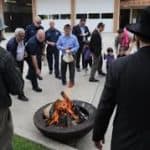Life Lessons from the Torah Portion
Parshat Tzav Leviticus 6:1-8:36
Enter into any torah centered Jewish home in this period prior to the festival of Pesach ( Passover ) and you will see a house in bedlam and disarray. Every member of the household is busy cleaning rearranging and overturning everything in the house in preparation for the awesome festival that is approaching. All this in the fulfillment of the verses “No leaven shall be eaten . . . For seven days you shall eat unleavened bread . . . and no leaven shall be seen of yours [in your possession].”(Exodus 13:3–7)
That is the source of the cleaning and the frenzy. Yet the hyper active activity and the zeal hints at something much deeper going on.What can explain the fervor and the zeal involved in the preparation.
In the torah portion of Tzav we read the following
And Hashem spoke (VaYidaber) to Moshe, saying (Leimor), Command (Tzav) Aaron and his sons, saying, This is the law of the burnt offering: That is the burnt offering which burns on the altar all night until morning, and the fire of the altar shall burn with it. And the kohen shall don his linen tunic, and he shall don his linen trousers on his flesh. And he shall lift out the ashes into which the fire has consumed the burnt offering upon the altar, and put them down next to the altar. He shall then take off his garments and put on other garments, and he shall take out the ashes to a pure place outside the camp. (Exodus 6:1-4)
One of the priestly services performed in the Holy Temple involved clearing the excess ashes which accumulated upon the altar. Significantly, it is the priest that is being asked “to take out the garbage”. The Priest involved with the work of the Holy of Holies was being asked to remove the refuse from the altar. All logic would have assumed that his high station of honor would have been desecrated by this menial labor. Yet it is clear that the removal of the refuse and the ashes was as much of an act of holiness and spiritual growth as the offering itself.
In order to grow one needs to acknowledge where our past journeys have taken us. We need to revisit what brought about past failures. Only when these are confronted and discarded can we begin to truly grow. Only when “who we were” is placed in context, can we begin the process of becoming “who we are meant to be”.
To commemorate and spiritually relive the Exodus from Egypt, the Jewish people are commanded by the Torah to celebrate the holiday of Pesach and are prohibited to eat or even to possess any Chametz (leaven) in their home:
The word Chametz means fermented or leavened. The leavening and the yeast represent the arrogance and puffed up ego that leads us away from the Divine missions in our life. Matzah, on the other hand is the only form of flour and water mixture permitted on Pesach. Yet Matzah itself can only be made from the five grains that have the potential to become Chametz. The obvious question is – why use the very ingredients that if used incorrectly would invalidate the item?
The underlying message is that the secret to obtaining freedom from the things that enslave us is not to always avoid those things but rather to elevate them. The very things that can entrap and enslave us can instead be elevated towards a higher purpose. “and he shall take out the ashes to a pure place outside the camp. (Exodus 6:4).
The Chametz as well is burnt in a “ceremonial fire” prior to the commencement of the festival.The act of preparation for the festival in itself becomes an act of holy effort and purpose.
That, then, becomes the focus of the search and the cleaning. That is to Identify and eliminate the constraints that keep us from our personal destiny. The Hebrew word for constraints is Meitzarim which is clearly linked to the Hebrew word for Egypt-Mitzrayim. The act of removing all that excess baggage and all that remains after we succeeded in finding our spiritual and pure core is in itself an act of holiness. So as it is in our own homes it was in the Temple as well. The same Priest involved with the work of the Holy of Holies is being given the holy task of separating out the ashes.
When we burn the Chametz ( leaven) we declare the following;
All leaven or anything leavened which is in my possession, which I have neither seen nor removed, and about which I am unaware, shall be considered nullified and ownerless as the dust of the earth.
May we be successful of removing all arrogant or wounded impediments (all the Meitzarim) blocking our growth in this festival of Liberation. May that be true in all our personal and corporate journeys towards destiny.
Chag Kasher ve Sameach
LeRefuat Yehudit bat Golda Yocheved

